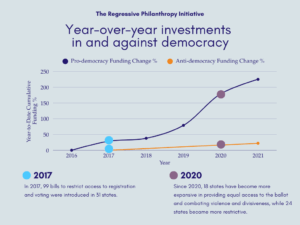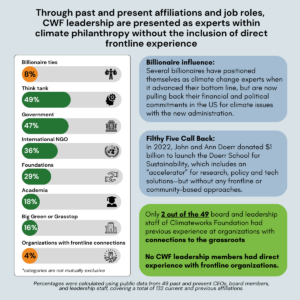When I was a kid, I sometimes paced around my room at night thinking about all the responses I wanted to give to things people said to me throughout the day. I usually promised myself that next time I was in a similar situation, I would use the clever lines that I had held back. Of course, life rarely puts you in the exact same situation twice, so most of my witty lines went unused.
Sometimes you only have one opportunity to say what you really think, and when you are engaging in a relationship with people or organizations who have more power or resources than you do, it’s even more important to take the opportunities to give feedback as they arise.
Many of us struggle to do that – I certainly have in my career serving in a variety of nonprofit organizations. But there’s an opportunity to shift the larger dynamics between funders and nonprofits in the long term if more us are courageous and say what is really on our minds (in a constructive way, of course).
Over the years, NCRP has offered insight to nonprofits about how we can all have more courageous conversations with funders. Here are a few of the themes we’ve heard and suggested:
1. Remember that you know things that they don’t. You are the expert in your work.
In relationships of mutual respect, both parties know that the other offers something of value and that they can learn from one another. Remind yourself of this to build confidence and prepare yourself to give honest feedback to funders.
2. Seek to understand their priorities – as individuals and as organizations. Ask your program officer about their interests and passions.
The better you understand your program officer and the funding organization, the better you can relate your work and your feedback to their priorities.
3. Invite them to experience your work first hand.
Your experience, and the experiences of the people you serve, are critical pieces of information for funders. But not every funder prioritizes time to learn about your work first hand. Take initiative to invite them to see what you do, especially if it will reinforce a perspective that the funder isn’t seeing.
4. Be specific, but constructive.
Critical feedback is hard to give and to receive, and being specific helps communication on both ends. Share your observations and how behavior or language impacted or triggered you, and, if you can, offer solutions or alternatives. Resources from sector groups like NCRP, Center for Effective Philanthropy and Exponent Philanthropy, and from nonprofit leaders like blogger Vu Lee, can help provide context for a courageous conversation.
5. Be “kind” – not “nice” just for the sake of politeness.
Being “nice” can lead us to avoid telling hard truths or addressing conflicts. However, we can share feedback in a way that respectfully explains harmful impacts whether it was intended or not.
6. Identify and communicate your self-interest beyond the grant, i.e. introductions to other funders, technical assistance, capacity building resources, etc.
Even if your primary relationship with a funder centers on grants, remember that the funder may have other resources that can be helpful to you. Your requests, and your constructive feedback, can include references to these resources.
Even if we practice these habits, feedback conversations can still be challenging. But without more courageous conversations, the harmful power dynamics between grantmakers and nonprofits will persist, stunting the benefits we collectively seek for our communities.
We recently had a conversation with an organization that had been receiving program funding for three years, but as they waited for their renewal, the foundation providing the support became increasingly unresponsive. After a few months the foundation’s president requested a phone call, during which they said that they’d likely be pulling funding for the program in question. The foundation head proceeded to ask questions about the organization’s other programs that the staff member found random and confusing.
Our nonprofit friend wished they could have been honest about how pulling funding would leave them in a lurch and directly ask why the funder was inquiring about other programs. Given the power dynamic and surprise of the unwelcome news, the nonprofit didn’t feel like they were in a position to have this courageous conversation.
How would you provide feedback in this situation? What has helped you have courageous conversations with funders? Let us know below or on Twitter if you have additional suggestions for how nonprofits can approach direct feedback to improve philanthropy.
 Jeanné Isler is vice president and chief engagement officer at the National Committee for Responsive Philanthropy. Thanks to senior associate for learning and engagement Caitlin Duffy for support with this post. Follow @j_lachapel and @NCRP on Twitter.
Jeanné Isler is vice president and chief engagement officer at the National Committee for Responsive Philanthropy. Thanks to senior associate for learning and engagement Caitlin Duffy for support with this post. Follow @j_lachapel and @NCRP on Twitter.





































































































































































































































































































































































































































